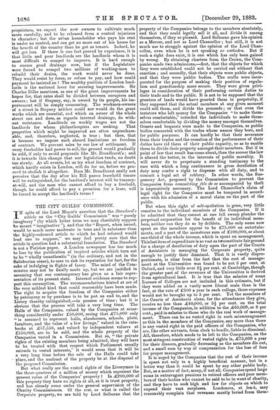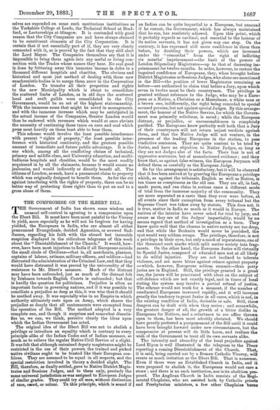THE CITY GUILDS' COMMISSION. T N spite of the Lord Mayor's
assertion that the Standard's article on the " City Guilds' Commission" was " purely imaginary" (by which latter term we may charitably suppose he meant " imaginative "), and that the "Report, when issued, would be much more moderate in tone and in substance than the highly-coloured article to which he had referred would lead one to suppose," we may feel pretty sure that the article in question had a substantial foundation. The Standard is not a Parisian paper. A London newspaper has too much to lose by the publication of inspired articles which turn out to be " wholly unauthentic " (in the ordinary, and not in the Elalisburian sense), to care to risk its reputation for fact, for the sake of indulging in flights of fancy. The mind of the Com- mission may not be finally made up, but we are justified in assuming that our contemporary has given us a fair repre- sentation of its present state. Internal evidence seems to sup- port this assumption. The recommendations hinted at are of the very mildest kind that could reasonably have been made. The right to acquire the freedom of the Companies either by patrimony or by purchase is to be put an end to, and the Livery thereby extinguished,—in process of time ; but it is obvious that the process will take a very long time. The Halls of the Companies, valued by the Companies at some- thing considerably under £50,000, seeing that £75,000 only 4' is assumed to represent halls, almshouses, schools, plate, furniture, and the value of a few livings," valued in the rate- books at £57,550, and valued by independent valuers at £150,000, are to be sold, and the whole property of the Companies vested in a Commission. But as, " the private rights of the existing members being admitted, they will have to be treated with that respect which Parliament usually extends to vested interests," it would seem that it will be a very long time before the sale of the Halls could take • place, and the usufruct of the property be at the disposal of the proposed Commission. But what really are the vested rights of the Liverymen in the three-quarters of a million of money which represent the present value of the Companies' property ? In £200,000 of this property they have no rights at all, as it is trust property, and has already come under the general supervision of the Charity Commissioners. Of the rest, or what is called the Corporate property, we are told. by Lord Selborne that the property of the Companies belongs to the members absolutely, and that they could legally sell it all, and divide it among themselves, if they so pleased. Lord Selborne gave his opinion as a Mercer, and not as Lord Chancellor ; but still, it is not much use to struggle against the opinion of the Lord Chan- cellor, even when he is not speaking ex cathedra. But if such a right does exist, it is one which has only been gained by wrong. By obtaining charters from the Crown, the Com- panies made two admissions,—first, that the objects for which they were established could not be carried out without that sanction ; and secondly, that their objects were public objects, and that they were public bodies. The crafts were incor- porated for the purpose of making their position of regula- tion and guardianship more secure. They were given privi- leges in consideration of their performing certain duties to their trade and to the public. It is not to be supposed that the grantors of lands would have granted them in perpetuity, if they supposed that the actual members at any given moment could sell them, and divide the proceeds ; or that even the testators who left money for the Companies " to make them- selves comfortable," intended the individuals to make them- selves comfortable by dividing the money amongst themselves. Grants and bequests were made to the Companies, as public bodies connected with the trades whose names they bore, and for public purposes. It can hardly be that their severance from their trades and the cessation of the performance of their duties have rid them of their public capacity, so as to enable them to divide their property amongst their members. But if in point of law that result has come about, then the sooner the law is altered the better, in the interests of public morality. It will never do to perpetuate a standing testimony to the ease with which a long continuance in gross dereliction of duty may confer a right to dispense with all duty, and to commit a legal act of robbery. In other words, the Sus- pensory Act, proposed by the Commission to prevent the Companies from committing fele de se accompanied by theft is imperatively necessary. The Lord Chancellor's claim of legal right for the Companies must be tempered in accord- ance with his admission of a moral claim on the part of the public.
But when this right of self-spoliation is gone, very little remains to the individual members of the Companies. If it be admitted that they cannot at one fell swoop plunder the perpetual corporation for the benefit of its individual mem- bers, neither can they do so by driblets. The only sums now spent on the members appear to be £75,000 on entertain- ments, and a part of the monstrous sum of £100,000, or about one-third of the whole income, which is spent on management. This last item of expenditure is so vast as tesconstitute fairground for a charge of dereliction of duty upon the part of the Courts of Assistants in managing the Corporate property, quite enough to justify their dismissal. That it is vastly dispro- portionate, is clear from the fact that the cost of manage- ment at the Universities was found to be not 3 per cent, at Oxford, and very little over 2-4- per cent. at Cambridge, though the greater part of the revenues of the Universities is derived from agricultural land. It is true that the salaries of some Bursars of Colleges are not included in this estimate, but if they were added on a vastly more liberal scale than is the fact, at the rate of £300 a year in each college, those expenses would not be brought up to 5 per cent. Yet the members of the Courts of Assistants alone, for the attendances they give, receive no less than £40,000, or 5 per cent. on the total income of the Companies, in addition to the £60,000, or 8 per cent., paid in salaries to those who do the real work of manage- ment. There can be no vested right in such mismanagement as this in the members of the Companies, any more than there is any vested right in the paid officers of the Companies, who are, like other servants, from clerk to beadle, liable to dismissal. All, therefore, which needs to be left to the Companies, on the most stringent construction of vested rights is, £75,000 a year for their dinners, gradually decreasing as the members die out, and a small sum by way of compensation for the loss of fees for proper management.
It is urged by the Companies that the rest of their income is spent not only in a highly beneficial manner, but in a better way than it could be spent by any other public body. But, as a matter of fact, many, if not all, Companies spend large sums in extravagant pensions to retired officers and poor mem- bers of their bodies who cannot be said to be in want of charity, and they have to seek high and low for objects on which to expend their vast surpluses. Londoners, at least, may reasonably complain that revenues mostly levied from them- selves are expended on some such meritorious institutions as the Yorkshire College at Leeds, the Technical School at Brad- ford, or Lectureships at Glasgow. It is contended with good reason that the City Companies are and have always claimed to be constituent elements of the City Corporation. It is certain that if not essentially part of it, they are very closely connected with it, as is proved by the fact that they still elect the Lord Mayor. The Companies themselves say that it is impossible to bring them again into any useful or living con- nection with the Trades whose names they bear. No real good is done by frittering away this immense income in doles to a thousand different hospitals and charities. The obvious and historical and most just method of dealing with these now anachronistic bodies is to merge them anew in the Corporation of London. To transfer all their properties and rights to the new Municipality which is about to consolidate the scattered limbs of London, as in old days the scattered local and craft guilds were consolidated in the City Government, would be an act of the highest statesmanship. With the immense sums that might be saved in management, and with the immense increase which may be anticipated in the actual income of the Companies, Greater London would thus be endowed with revenues which would at once obviate the necessity of continuing those taxes on corn and coal which press most heavily on those least able to bear them.
This scheme would involve the least possible interference with present " rights of property," the least possible inter- ference with historical continuity, and the greatest possible amount of immediate and future public advantage. It is the one which, among all the conflicting claims of technical, primary and middle-class, and University education, and multi- tudinous hospitals and charities, would be the most readily acquiesced in by all the claimants, because it would create no jealousies, and would indirectly or directly benefit all. The citizens of London, as such, have a paramount claim to property which was originally designed to benefit them. As for the cry against interfering with the rights of property, there can be no better way of protecting those rights than to put an end to a gross abuse of them.



































 Previous page
Previous page